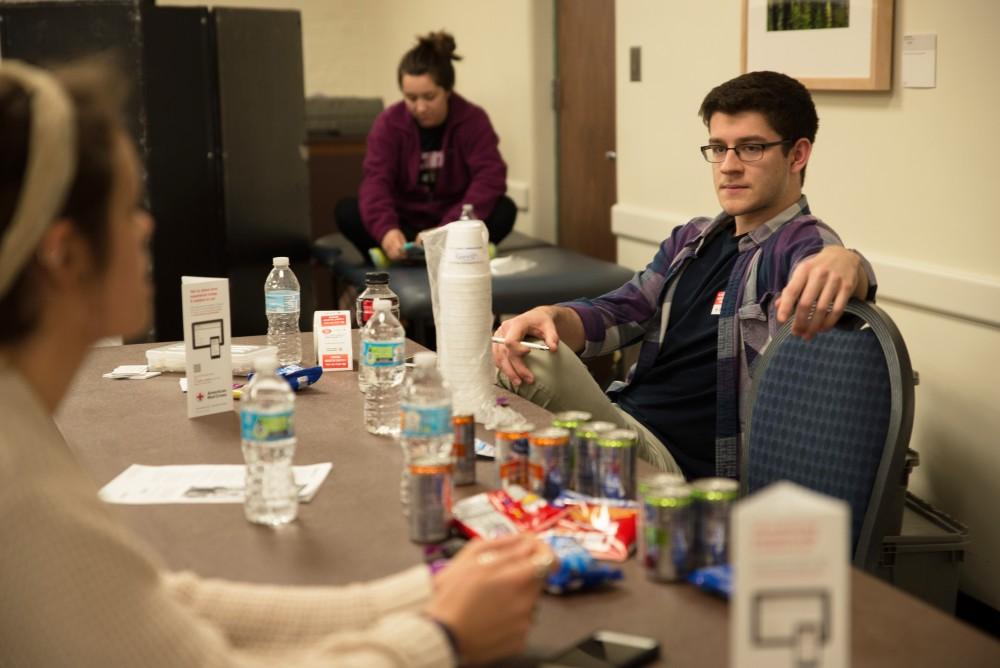Red Cross calls for blood donations

GVL / Luke Holmes – Tony Alberty chills out at the refreshments table where students can relax after drawing blood. The blood drive was held by the American Red Cross in the Grand River Room Wednesday, Mar. 30, 2016
Mar 31, 2016
Headline: Red Cross calls for blood donations
By: Jess Hodge
Americans who suffer traumatic blood loss rely on the 6.8 million donors across the country to replace the blood that was lost. Recently, American Red Cross has had an increase in the need for O negative blood donors.
Type O blood is the most popular blood type requested by hospitals in the U.S. People with O negative blood are important because they are known as “universal donors,” meaning their blood can be given to anyone with any blood type and the recipient’s body won’t have a negative reaction. If people receive blood that is not the same type as their own, the body will start to reject the blood and can cause life-threatening side effects.
Todd Kulman, external communications manager for American Red Cross in the Great Lakes region, said O negative blood is essential to Red Cross, hospitals and patients.
“Type O negative is the universal blood type and can be transfused to patients with any blood type,” he said. This is often helpful during emergency situations when patients don’t have time to be ‘typed.’
People who undergo major surgery and people who have diseases that cause anemia are most likely to need a blood transfusion, according to American Red Cross. These people can be typed, meaning the hospital has the time to determine their blood type and receive the correct type of blood transfusion. However, victims in a car accident or natural disaster victims who suffer severe trauma don’t have the time for doctors to type their blood and therefore receive O negative.
So why is Red Cross so urgent for blood? O negative blood is difficult to come by. Kulman said there is always a need for O Negative blood donors.
“Less than 7 percent of the U.S. population has O negative blood,” he said. “Hospitals depend on frequent O negative blood donations to ensure it is always available for patients.”
Every day, Red Cross has to collect an average of 14,000 pints of blood so they are able to meet patient needs. The average person gives three pints during one donation, meaning Red Cross would need about 4,666 donors in one day.
Tracy Heath, a Red Cross nurse, said each blood drive has a specific number of donors they want to reach as their goal. Each goal is different depending on the time of day and the location. Each drive is staffed depending on their pre-determined goal. Goals can range anywhere from 25-100 donors.
Heath said during spring break, the need for donations goes up but the number of donors decreases.
“About 20 percent of our donations come from high school and college drives,” she said.
To try to recruit more donors overall, including more O negative donors, Red Cross is being deliberate about contacting people and informing the public about the need for blood.
“Donors are being targeted through direct email and telephone,” Kulman said.
Donating blood takes a minimal amount of time and can help save multiple people’s lives. Grand Valley State University is hosting two more American Red Cross blood drives this semester: April 4 in the Kirkhof Center Grand River Room from 11 a.m. until 5 p.m. and April 8 in the Kirkhof Center Pere Marquette Room from 11 a.m. until 3 p.m.
GVSU is also looking for organizations who want to host blood drives during the 2016-17 school year.
Kulman encourages people of all blood types to donate and save someone’s life.
“Donating blood only takes about an hour,” she said. “You’ll feel good knowing you may have helped save someone’s life.”
For more information, visit www.orgsync.com/62943/forms/102718 to fill out a form for hosting a blood drive.

























